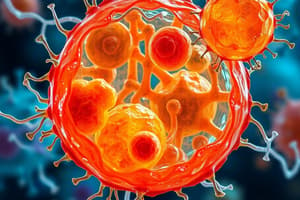Podcast
Questions and Answers
What is a key characteristic that distinguishes eukaryotic cells from prokaryotic cells?
What is a key characteristic that distinguishes eukaryotic cells from prokaryotic cells?
Why can eukaryotic cells perform complex metabolic reactions more effectively than prokaryotic cells?
Why can eukaryotic cells perform complex metabolic reactions more effectively than prokaryotic cells?
How does the structure of eukaryotic cells contribute to their function?
How does the structure of eukaryotic cells contribute to their function?
What role do lysosomes play in eukaryotic cells?
What role do lysosomes play in eukaryotic cells?
Signup and view all the answers
Which of the following statements about prokaryotic cells is accurate?
Which of the following statements about prokaryotic cells is accurate?
Signup and view all the answers
What analogy is used to compare prokaryotic cells?
What analogy is used to compare prokaryotic cells?
Signup and view all the answers
Which function is NOT associated with the organelles found in eukaryotic cells?
Which function is NOT associated with the organelles found in eukaryotic cells?
Signup and view all the answers
How do eukaryotic cells maintain distinct environments for their organelles?
How do eukaryotic cells maintain distinct environments for their organelles?
Signup and view all the answers
Flashcards
Prokaryotic Cell
Prokaryotic Cell
A simple cell, like in bacteria, without internal membranes; it's like a one-room cabin.
Eukaryotic Cell
Eukaryotic Cell
A complex cell, found in plants, fungi, and animals which has many compartments (like rooms) with specialized functions, separated by membranes.
Membrane-bound Nucleus
Membrane-bound Nucleus
A central compartment in a eukaryotic cell that holds the cell's DNA.
Membrane-bound Organelles
Membrane-bound Organelles
Signup and view all the flashcards
Lysosomes
Lysosomes
Signup and view all the flashcards
Peroxisomes
Peroxisomes
Signup and view all the flashcards
Multiple Linear Chromosomes
Multiple Linear Chromosomes
Signup and view all the flashcards
Cytosol
Cytosol
Signup and view all the flashcards
Study Notes
Prokaryotic vs. Eukaryotic Cells
- Prokaryotic cells (like bacteria) are simple, resembling a single room with no internal compartments.
- Eukaryotic cells (in plants, fungi, and animals) are more complex, like a house with many rooms (compartments) for specialized functions.
- Eukaryotic cells have internal membranes that separate different compartments, allowing them to maintain different conditions in each.
Eukaryotic Cell Features
- Membrane-bound nucleus: Contains the cell's genetic material, enclosed by a membrane.
- Membrane-bound organelles: Specialized compartments with unique functions, like tiny organs. These float within the cytosol.
- Multiple linear chromosomes: Eukaryotic cells have multiple linear strands of DNA, unlike prokaryotes' single circular chromosome.
Compartmentalization in Eukaryotic Cells
- Lysosomes: Recycling centers maintaining an acidic environment for waste disposal.
- Peroxisomes: Isolate oxidation reactions and hydrogen peroxide production, preventing cellular damage.
- Compartmentalization allows for complex metabolic processes unavailable to prokaryotes. Also allows for far larger cell size compared to prokaryotes.
Studying That Suits You
Use AI to generate personalized quizzes and flashcards to suit your learning preferences.
Description
Test your knowledge of the differences between prokaryotic and eukaryotic cells with this quiz. Explore key features of eukaryotic cells, including their compartmentalization and specialized organelles. See how well you understand the complexities of cell structure and function.




